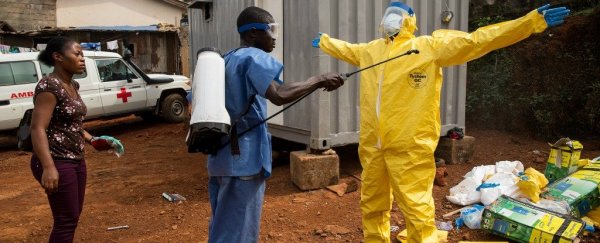The most serious outbreak of the Ebola virus since an epidemic devastated West Africa two years ago, killed 11,000 people and catapulted the disease back into the global consciousness, is almost assuredly over.
Out of an abundance of caution, though, health officials will closely monitor the situation for another three weeks before making the final declaration.
As of Wednesday, contacts of the last confirmed case of the virus have passed a 21-day incubation period without showing signs of infection. That means that no one who was in contact with an infected person needs to be monitored on a daily basis anymore.
A total of 38 cases were confirmed, of which 14 died. Another 15 people most likely died of the disease, as well. For the past three weeks, all suspected cases have turned out to be negative.
For an Ebola outbreak to be officially declared over, however, two incubation periods (a total of 42 days) must pass without any confirmed cases.
So begins the countdown to the end of Congo's ninth and most worrisome Ebola outbreak.
It was declared on May 8, when a cluster of cases was confirmed deep in the rain forest of the country's Equateur province. Over the next three weeks, the virus made its way to Mbandaka, a regional transport hub and city of 1.2 million along the heavily trafficked Congo and Ruki rivers.
Ebola is far harder to contain in densely populated urban areas, and the possibility of a traveler contracting the disease and taking it to another part of the country increased greatly.
"This outbreak has been the most challenging and complex outbreak the country has ever had to face, mainly because it started in two rural zones at the same time and quickly reached a city of more than 1 million inhabitants directly connected to Kinshasa, our capital city where 12 million Congolese live," Congo's minister of health, Oly Ilunga, told The Washington Post.
"Yet thanks to a rapid national and international mobilization as well as a great government-led coordination of the response, we managed to contain this outbreak in just seven weeks."
According to the minister, 1,706 contacts of those either confirmed or thought to have contracted Ebola were traced and monitored. Contact tracing, as the process is called, requires establishing a vast surveillance team to watch people's movements from town to town and reporting any cases of fever that could be Ebola.
That tracing also was used in a new way during this outbreak: to identify candidates for an experimental Ebola vaccine that had only been used once before, in the waning days of the West African epidemic.
More than 3,300 people ultimately were administered with the vaccine, which the health minister referred to as a "game-changer."
Ebola is endemic to Congo's rain forests. Because of its prevalence in the country, Congo's health officials have had more practice than anyone else in containing the virus, and they are generally reputed to be the most skilled at it in the world.
But Ebola is not a virus that one simply contains and forgets about.
"As Ebola is a virus whose natural reservoir is located in the Equatorial Forest, we must prepare ourselves for the 10th Ebola outbreak," said Ilunga.
"Moreover, with the greater mobility of the population, we can expect to have other outbreaks in urban zones in the future. We must learn the lessons from this response and strengthen our system in order to detect and respond even more efficiently to the next outbreak."
2018 © The Washington Post
This article was originally published by The Washington Post.
